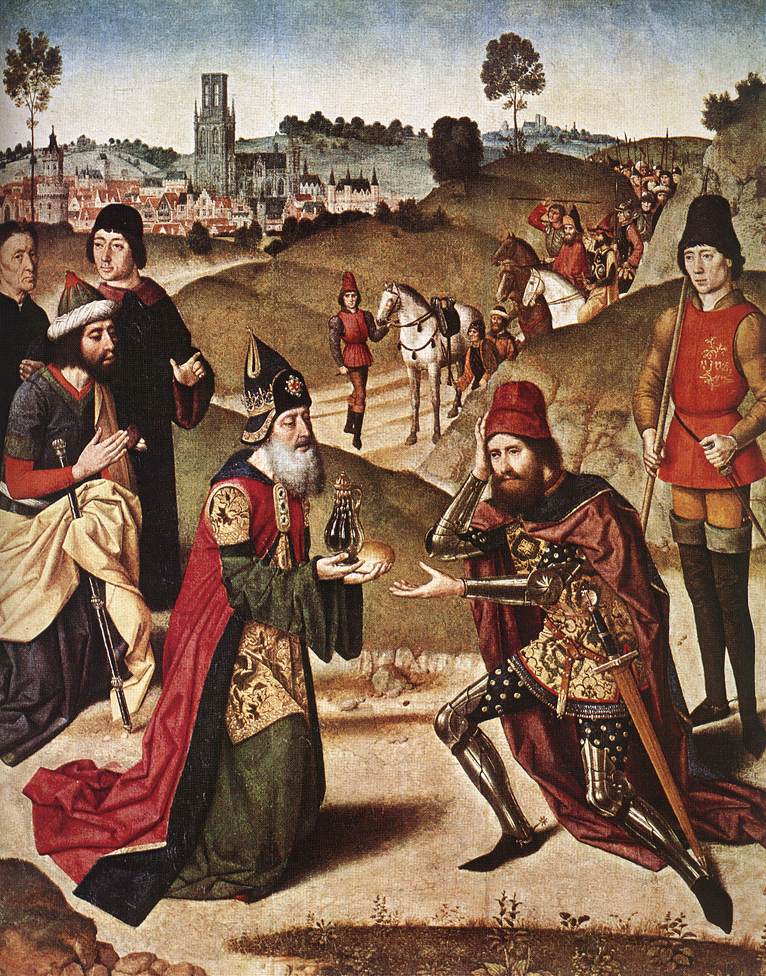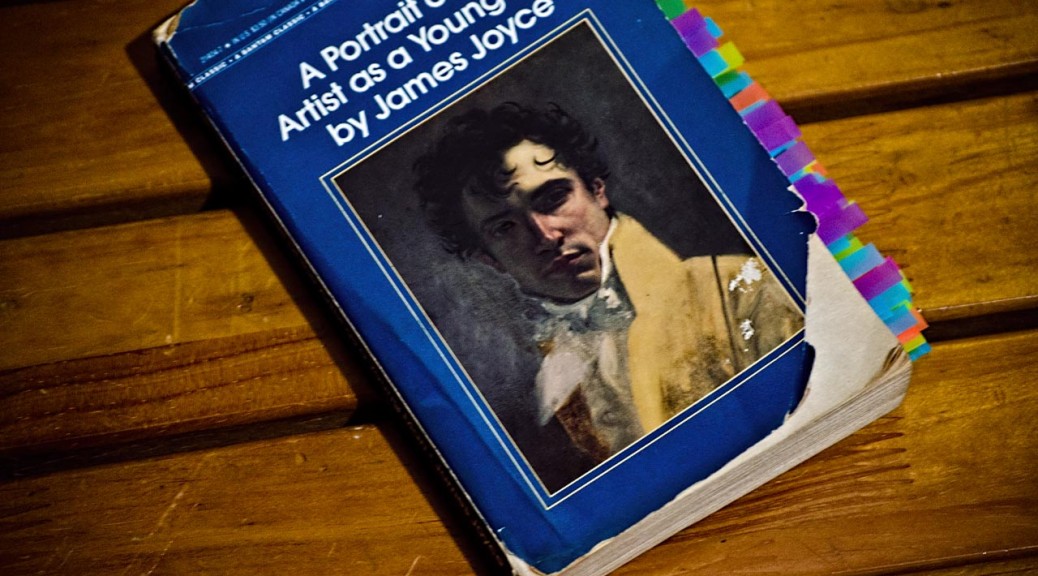Joyce, James. A Portrait of The Artist as a Young Man. New York: Bantam Books, 1992. Print. (First Edition 1916).
—
“sighting in the ascent, through a region of viscid gloom.
“He halted on the landing before the door and then, grasping the porcelain knob, opened the door quickly. He waited in fear, his soul pining within him, praying silently that death might not touch his brow as he passed over the threshold, that the fiends that inhabit darkness might not be given power over him. He waited still at the threshold as the entrance to some dark cave. Faces were there; eyes: they waited and watched.” p. 130
“He had sinned. He had sinned so deeply against heaven and before God that he was not worthy to be called God’s child.” p. 131
“His eyes were dimmed with tears and, looking humbly up to heaven, he wept for the innocence he had lost.” p. 133
“Once soul was lost; a tiny soul: his. It flickered once and went out, forgotten, lost. The end: black cold void waste.” p. 134
“and had first spoked of the kingdom of God to poor fishermen, teaching all men to be meek and humble of heart.” p. 135
“he called first to His side, the carpenters, the fishermen, poor and simple people following a lowly trade, handling and shaping the wood of trees, mending their nets with patience.” p. 135
“His blood began to murmur in his veins, murmuring like a sinful city summoned from its sleep to bear its doom. Little flakes of fire fell and powdery ashes fell softly, alighting on the houses of men. They stirred, waking from sleep, troubled by the heated air.” p. 136
“SUNDAY was dedicated to the mystery of the Holy Trinity, Monday to the Holy Ghost, Tuesday to the Guardian Angels, Wednesday to Saint Joseph, Thursday to the Most Blessed Sacrament of the Altar, Friday to the Suffering Jesus, Saturday to the Blessed Virgin Mary.” p. 141
“the three theological virtues, in faith in the Father Who had created him, in hope in the Son Who had redeemed him, and in love of the Holy Ghost Who had sanctified him;” p. 142
“Frequent and violent temptations were a proof that the citadel of the soul; had not fallen and that the devil raged to make it fall.” p. 147
“Some of the boys had then asked the priest if Victor Hugo were not the greatest French writer. The priest had answered that Victor Hugo had never written half so well when he had turned against the church as he had written when he was a catholic.” p. 150
“He had seen himself, a young and silentmannered priest, entering a confessional swiftly, ascending the altarsteps, incensing, genuflecting, accomplishing the vague acts of the priesthood which pleased him by reason of their semblance of reality and of their distance from it.” p. 152

Dieric Bouts,the older. At The Church of Saint Peter, Leuven, Belgium. Created: 1464 – 1467. Via Wikimedia.
“the order of Melchisedec.” p. 153
*****”He drew forth a phrase from his treasure and spoke it softly to himself:
-A day of dapled seaborne clouds.-
The phrase and the day and the scene harmonised in a chord. Words. Was it their colours? He allowed them to glow and fade, hue after hue: sunrise gold, the russet and green of apple orchards, azure of waves, the grey-fringed fleece of clouds. No, it was not their colours: it was the pose and balance of the period.” p. 160
askance
***”They were voyaging across the deserts of the sky, a host of nomads on the march, voyaging high over Ireland, westward bound. The Europe they had come from lay out there beyond the Irish Sea, Europe of strange tongues and valleyed and woodbegirt and citadelled and of entrenched and marshalled races.” p. 161

John Everett Millais – National Portrait Gallery. Via Wikimedia.
“His morning walk across the city had begun; and he foreknew that as he passed the sloblands of Fairview he would think of the cloistral silverveined prose of Newman; that as he walked along the North Strand Road, glancing idly at the windows of the provision ships, he would recall the dark humour of Guido Cavalcanti and smile; that as he went by Baird’s stone cutting works in Talbot Place the spirit of Ibsen would blow though him like a keen wind, a spirit of wayward boyish beauty;”p. 170
“His mind when wearied of its search for the essence of beauty amid the spectral words of Aristotle or Aquinas turned often for its pleasure to the dainty songs of the Elizabethans.” p. 170
“His thinking was a dusk of doubt and selfmistrust, lit up at moments by the lightnings of so clear a splendour that in those moments the world perished about his feet as if it had been fire consumed: and thereafter his tongue grew heavy and he met the eyes of others with unanswering eyes for he felt that the spirit of beauty had folded him round like a mantle and that in reveie at least he had been acquainted with nobility.” p. 171
“he had tried to peer into the social life of the city of cities through the words implere ollam denariorum which the rector had rendered sonorously as the filling of a pot with denaries.” p. 174
“but yet it wounded him to think that he would never be but a shy guest at the feast of the world’s culture and that the monkish learning, in terms of which he was striving to forge out an esthetic philosophy, was held no higher by the age he lived in than the subtle and curious jargons of heraldry and falconry.” p. 174
“the droll statue of the national poet of Ireland.” p. 174
“-Aquinas-answered Stephen-says pulcra sunt quæ visa placent.-” p. 180
“-In so far as it is apprehended by the sight, which I suppose means here esthetic intellection, it will be beautiful. But Aquinas also says Bonum est in quod tendit appetitus. In so far as it satisfies the animal craving for warmth fire is a good. In hell, however, it is an evil.-” p. 180

Nineteenth century Photochrom postcard of the Cliffs of Moher in County Clare in Ireland showing cliffside table and refreshments. Via Wikimedia.
“-These questions are very profound, Mr Dedalus-said the dean.-It is like looking down from the cliffs of Moher into the depth. Many go down into the depths and never come up. Only the trained diver can go down into those depths and explore them and come to the surface again.-” p. 181
“You know Epictetus?-
-An old gentleman-said Stephen coarsely-who said that the soul is very like a bucketful of water.-
-He tells us in his homely way-the dean went on-that he put an iron lamp before a statue of one of the gods and that a thief stole the lamp. What did the philosopher do? He reflected that it was in the character of a thief to steal and determined to buy and earthen lamp next day instead of the iron lamp.-” p. 181
“whether words are being used according to the literary tradition or according to the tradition of the marketplace. I remember a sentence of Newman’s, in which he says of the Blessed Virgin that she was detained in the full company of the saints. The use of the word in the marketplace is quite different. I hope I am not detaining you.-” p. 182
“That?-said Stephen.-Is that called a funnel? Is it not a tundish?-” p. 182
“-And to distinguish between the beautiful and the sublime-the dean added-to distinguish between moral beauty and material beauty. And to inquire what kind of beauty is proper to each of the various arts.” p. 184
“-In pursuing these speculations-said the dean conclusively-there is, however, the danger of perishing of inanition.” p. 184

The British Library – Image taken from page 274 of ‘Finland in the Nineteenth Century: by Finnish authors. Illustrated by Finnish artists. Via Wikimedia.
“-I may not have his talent-said Stephen quietly.
-You never know-said the dean brightly.-We never can say what is in us. I most certainly should not be despondent. Per aspera ad astra.-“
